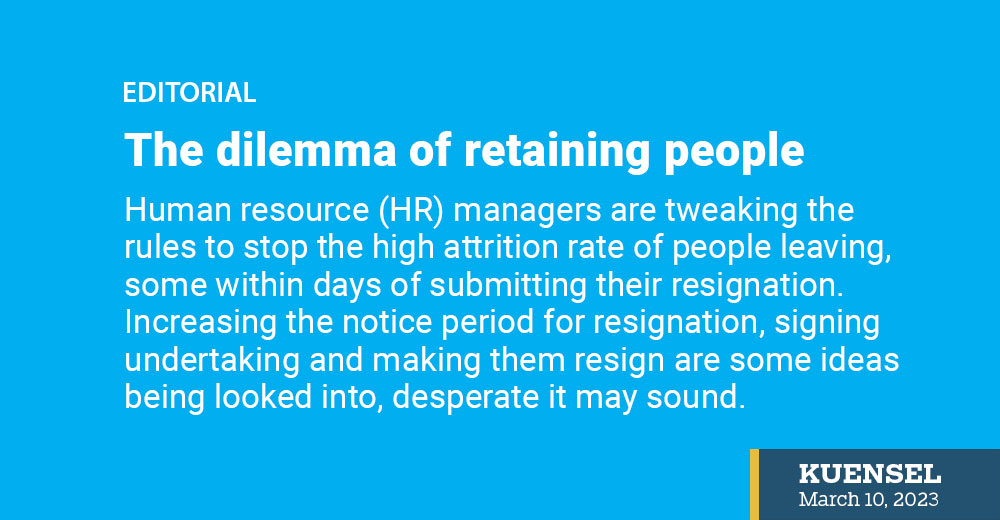Human resource (HR) managers are tweaking the rules to stop the high attrition rate of people leaving, some within days of submitting their resignation. Increasing the notice period for resignation, signing undertaking and making them resign are some ideas being looked into, desperate it may sound.
For employers, it is a strategy to buy time for HR planning, if not discourage them. But given the opportunities abroad, it is an uphill task. Paying back three months’ salary is nothing if a visa to Australia or the US is secured. Even if the penalty is a year’s salary refund, there is no turning back. This is the scope, assumed or real, putting HR managers in a dilemma.
Planning human resources including succession plans is at the heart of HR managers, but it is slipping away from their hands. This is the ripple effect of the vacuum created by the exodus of Bhutanese. Human resource management strategies like retention or succession plans are not viable in the current situation. If thousands are leaving the country for better opportunities, there are an equal number of those wanting to change jobs for better perks and remunerations.
The smaller or poorer corporations or state-owned enterprises are at the losing end. If Australia is not the destination, it is the sudden openings within the country. They have become the hunting ground for companies. A few thousands of ngultrums or a change of job is enough to convince.
In the current scenario, no retention plan will work. If salary and perks were one, it is proven by the high rate of resignations from companies that pay well. Why are people from the Druk Holding and Investments companies resigning? The central bank that pays better remuneration than many others cannot stop people from leaving. In one lucrative DHI company, about 30 have left since January this year. The chief laments having only managers and not staff in some of his divisions.
HR managers and their dilemma will continue as long as Bhutanese get a visa to abroad and the odd jobs can bring them better remunerations. It will be long before the exodus stops. But HR managers need to keep their company running.
Some of the initiatives to stop people from leaving or surprising employers will conflict with our labour laws. A contract is enforceable only when freely entered into without threat or undue influence. Trying to stop one with a six-month notice period or to make them resign after not securing a visa could violate labour regulations.
However, with the change in the labour market – we need to relook into our regulations. We need doctors, teachers, technicians, engineers and many more to keep our services running, for instance. Above all, we need to rethink creating the environment and the opportunity to stop people from leaving jobs or the country.


